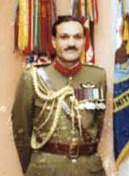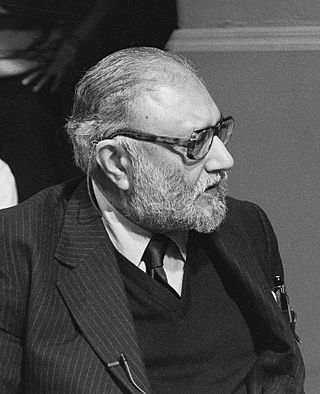Related Research Articles

Quaid-i-Azam University Islamabad, founded as University of Islamabad, is a public research university in Islamabad, Pakistan.

A Short History of Pakistan is an edited book published by University of Karachi Press and comprises four volumes. The book is edited by Prof Ishtiaq Hussain Qureshi and provides a comprehensive account of the history of the Pakistan region and its people from the prehistory leading to the creation of Pakistan and East Pakistan which then became Bangladesh. Complete set of four volumes are sequentially titled as, Book One: Pre-Muslim Period by Ahmad Hasan Dani; Book Two: Muslim Rule under the Sultans by M. Kabir; Book Three: The Mughul Empire by Sh. A. Rashid; and, Book Four: Alien Rule and the Rise of Muslim Nationalism by M. A. Rahim et al.

Sheikh Anwarul Haq, was a Pakistani jurist and an academic who served as the 9th Chief Justice of Pakistan from 23 September 1977 until resigning on 25 March 1981. He signed the death warrant for former Prime Minister Zulfikar Ali Bhutto in a controversial murder case. Bhutto was executed on April 4, 1979.

The Higher Education Commission is a statutory body formed by the Government of Pakistan which was established in 2002 under the Chairmanship of Atta-ur-Rahman. Its main functions are funding, overseeing, regulating and accrediting the higher education institutions in the country.
Ziauddin Ahmad Suleri, best known as Z. A. Suleri, was a Pakistani political journalist, conservative writer, author, and Pakistan Movement activist. He is regarded as one of the pioneers of print journalism in Pakistan, and authored various history and political books on Pakistan as well as Islam in the South Asian subcontinent.
The publishing industry in Pakistan is hampered both by a low literacy rate (65%).

The National University of Modern Languages (NUMLs) (Urdu: قومی جامعہ جدید زبانیں) is a multi-campus public university with its main campus located in Islamabad, Pakistan and other campuses in different cities of Pakistan.
Syed Nawab Haider Naqvi is a Pakistani economist and scholar.

The One Unit Scheme was the reorganisation of the provinces of Pakistan by the central Pakistani government. It was led by Prime Minister Muhammad Ali Bogra on 22 November 1954 and passed on 30 September 1955. The government claimed that the programme would overcome the difficulty of administering the two unequal polities of West and East Pakistan separated from each other by more than a thousand miles. To diminish the differences between the two regions, the 'One Unit' programme merged the four provinces of West Pakistan into a single province to parallel the province of East Pakistan.
Pervaiz Iqbal Cheema was a Pakistani political scientist, cricketer, and a professor of International Relations and was last working as Dean, Faculty of Contemporary Studies, National Defence University, Islamabad - Pakistan.

Pakistan studies curriculum is the name of a curriculum of academic research and study that encompasses the culture, demographics, geography, history, International Relations and politics of Pakistan. The subject is widely researched in and outside the country, though outside Pakistan it is typically part of a broader South Asian studies or some other wider field. Several universities in Pakistan have departments and research centers dedicated to the subject, whereas many independent research institutes carry out multidisciplinary research on Pakistan Studies. There are also a number of international organizations that are engaged in collaborative teaching, research, and exchange activities on the subject.

General Khalid Mahmud ArifNI(M) HI(M) SI(M) SBt LoM popularly known as K.M. Arif, was a senior officer of the Pakistan Army, serving as the vice-chief of army staff under President Zia-ul-Haq, who retained the command of the army since 1976.

Science and technology is a growing field in Pakistan and has played an important role in the country's development since its founding. Pakistan has a large pool of scientists, engineers, doctors, and technicians assuming an active role in science and technology. The real growth in science in Pakistan occurred after the establishment of the Higher education Commission in 2002 which supported science in a big way and also became the major sponsor of the Pakistan Academy of Sciences under the leadership of Prof. Atta-ur-Rahman. The emphasis was placed on quality rather than numbers during this period. The quality measures introduced by Prof. Atta-ur-Rahman as Founding Chairman HEC included:1) All Ph.D. thesis were evaluated by eminent foreign scientists,2) All PhD theses and research papers were checked for plagiarism 3) Some 11,000 students were sent abroad to leading universities for PhD level training and absorbed on their return, 4) Appointments at faculty positions were linked to international stature of the applicants as judged from their international publications, patents and citations, and (5) Quality Enhancement Cells were established in all universities for the first time in the history of the country. (6) The minimum criteria for establishment of a new university were approved by the Cabinet and universities that did not meet these criteria were closed down. (7) The Model University Ordinance was approved setting the governance parameters for new universities. (8) A list of fake higher education institutions was prepared and made public. (9) Quality Assurance Agency (QAA) was set up within the Higher Education Commission that established Quality Enhancement Cells (QECs) as its operational units in public and private-sector universities across the country. (10) The funding of universities was linked to excellence in teaching and research under a formula based funding mechanism that considered enrolment, subjects and quality of teaching and research. The first IT policy and implementation strategy was approved under the leadership of Prof. Atta-ur-Rahman, then Federal Minister of Science & technology, in August 2000 which laid the foundations of the development of this sector On the request of Prof. Atta-ur-Rahman, Intel initiated a nationwide programme to train school teachers in Information and Communication technologies in March 2002 which has led to the training of 220,000 school teachers in 70 districts and cities across Pakistan. A 15-year tax holiday was approved on the recommendation of Prof. Atta-ur-Rahman which has resulted in growth of IT business from $30 million in 2001 to over $3 billion. The Pakistan Austria University of Applied Engineering (Fachhochschule) has been established in Haripur Hazara under a Steering Committee Chaired by Prof. Atta-ur-Rahman in which students will get degrees from several Austrian universities. Pakistan's growth in scientific output can be seen from the fact that in 1990 Pakistan published 926 scholarly documents while in 2018 the number rose to 20548, a twenty times increase.In contrast India published 21443 scholarly documents in 1990 and the number rose to 171356 in 2018, an eight times increase. In 2018, 336 people per million were researchers in the R&D in Pakistan compared to 256 people per million being researchers in India. The reforms begun by Prof. Atta-ur-Rahman FRS in 2003-2008 have continued over the subsequent decade and according to the Web of Science report, there was a 300% growth in research publications in 2019 over the decade, with 2019 marking the first year in which Pakistan was ranked above the world average in research. In 2019, Pakistan produced 300% more publications indexed in the Web of Science Core Collection than in 2010. In the decade of 2010-2019, more than half of Pakistan’s research was published in journals with Impact Factor. The global influence of Pakistan’s research is increasing as scientists in the country are publishing more in top quartile journals. The Category Normalized Citation Impact of Pakistan’s publications has risen from 0.67 to 1.03. output. As of 2020, Pakistan has 85% teledensity with 183 million cellular, 98 million 3G/4G and 101 million broadband subscribers, due to the foundations laid by Prof. Atta-ur-Rahman of the IT and telecom industry during 2000-2008. In an analysis of scientific research productivity of Pakistan, in comparison to Brazil, Russia, India and China, Thomson Reuters has applauded the developments that have taken place as a result of the reforms introduced by Prof. Atta-ur-Rahman FRS, since Pakistan has emerged as the country with the highest increase in the percentage of highly cited papers in comparison to the "BRIC" countries
Salma Malik is a teacher at the Department of Defence and Strategic Studies, Quaid-e-Azam University in Islamabad, Pakistan.
Tariq Rahman is a Pakistani academic scholar, newspaper columnist, researcher, and a writer.

Uzma Aslam Khan is a Pakistani writer. Her five novels include Trespassing (2003), The Geometry of God (2008), Thinner Than Skin (2012) and The Miraculous True History of Nomi Ali (2019).
Arif Hasan, is a Pakistani architect, planner, activist, social researcher, and writer. He is a recipient of Hilal-i-Imtiaz, the country's second highest award for its citizens.
Karachi Literature Festival (KLF) is an annual international literary festival held in Karachi, Pakistan. It is the first festival of its kind in Pakistan. It is one of the world's youngest and fastest growing literary festivals. Till 2019, ten festivals have been held.
Niaz Fatehpuri (1884–1966) was the pen name of Niyaz Muhammed Khan, a Pakistani Urdu poet, writer, and polemicist. He was also the founder and editor of Nigar. In 1962, he was awarded the Padma Bhushan by the President of India for "Literature and Education."
References
- ↑ [ permanent dead link ] Official KLF website. Retrieved 9 February 2011.
- ↑ Resume under Faculty Department of History, QU Retrieved 9 February 2011.
- ↑ Niaz, Ilhan (20 August 2012). "Pakistan's Brief Case Warriors". CFR and Foreign Affairs. Retrieved August 26, 2012.
{{cite magazine}}: Cite magazine requires|magazine=(help) - ↑ "Old World Empires: Cultures of Power and Governance in Eurasia".
- ↑ "Oxford University Press, Pakistan". Archived from the original on 2015-04-12. Retrieved 2015-04-12.
- ↑ "REVIEW: Old World Empires by Ilhan Niaz". 11 January 2015.
- ↑ Faculty Department of History, QU Retrieved 9 February 2011.
- ↑ Book Amazon Canada Retrieved 9 February 2011.
- ↑ Correspondent, Our (26 September 2013). "Recognition: Twin cities' teachers bag 12 out of 33 awards for research". Express Tribune. Retrieved September 27, 2013.
- ↑ "Archived copy". Archived from the original on 2016-09-23. Retrieved 2016-07-05.
{{cite web}}: CS1 maint: archived copy as title (link)